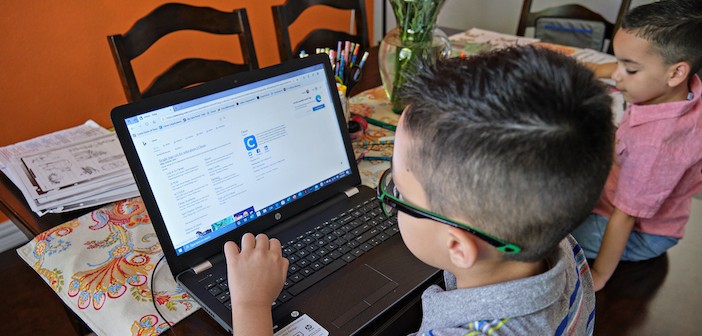While addressing the House Committee on Education and Labor today, Superintendent Michael Hinojosa urged federal lawmakers to pass legislation that provides funding to increase access to high-speed internet service for families.
Several bills up for consideration in Congress would help increase access to high-speed internet access, which Hinojosa said is necessary not only for students to learn at home, but also for families to access telemedicine and apply for jobs. Hinojosa’s testimony to the committee follows the March launch of “Operation Connectivity,” a collaborative effort led by Hinojosa with local, state and national civic and business leaders to expand high-speed internet access in the community.
“Broadband connectivity is a huge issue for us,” Hinojosa told the committee. “If we have to shut down again or offer virtual instruction, we have to knock down the front door and provide that opportunity for students to learn from home.”
Hinojosa’s virtual testimony to the committee in Washington D.C. provided an overview of how Dallas ISD has responded to the COVID-19 threat since closing school buildings in March.
When school buildings first closed, an estimated 36,000 Dallas ISD households had no Internet connectivity. Thanks to action by the Dallas ISD Board of Trustees, Dallas Education Foundation and 1Million Project, the district distributed 15,800 mobile hotspots to Dallas ISD families as of May 1.
Every Dallas ISD family should now have access to Internet through a mobile hotspot. Hinojosa said the mobile hotspots are a great short-term solution, but that the reliable and faster broadband Internet connectivity for all families is a necessary long-term solution.
Looking forward
Hinojosa said that when the district first surveyed parents on what learning model they would be interested in for the 2020–2021 school year, about 70 percent of parents said they would prefer in-person learning and 30 percent would prefer at-home learning. As the number of COVID-19 cases in Dallas increased, a parent survey issued several weeks later showed a 50/50 split; Hinojosa said he now predicts a majority of parents would prefer at-home learning over in-class instruction.
Likewise, a teacher survey at the beginning of the summer showed that 91 percent of Dallas ISD educators would be willing and able to come back and teach in person. The district is taking a new survey of teachers and staff, and Hinojosa expects significantly more respondents will not want to teach in-person.
Hinojosa’s testimony comes about five hours before the Dallas ISD Board of Trustees hold a meeting to consider moving the first day of school from Aug. 17 to Sept. 8 and formally offering both in-person and virtual instruction.
In testifying before the House Committee on Education and Labor, Hinojosa joined Leslie Boggs, president of the National Parent Teacher Association, Penny Schwinn, commissioner of education for the Tennessee Department of Education, and Sean O’Leary, vice chair of the Committee on Infectious Diseases American Academy of Pediatrics.
“We are here to ask what Congress must do to help American students get back to school during this pandemic,” said Rep. Gregorio Sablan, chair of the House Early Childhood, Elementary, and Secondary Education Subcommittee. “All of us want schools to reopen for full time in-person instruction as soon as possible…The question is what must Congress do to help our schools get students and faculty back into the classroom safely.”

